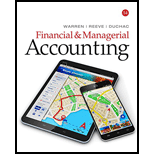
Concept explainers
(a)
Bank reconciliation: Bank statement is prepared by bank. The company maintains its own records from its perspective. This is why the cash balance per bank and cash balance per books seldom agree. Bank reconciliation is the statement prepared by company to remove the differences and disagreement between cash balance per bank and cash balance per books.
Debit and credit rules:
- Debit an increase in asset account, increase in expense account, decrease in liability account, and decrease in stockholders’ equity accounts.
- Credit decrease in asset account, increase in revenue account, increase in liability account, and increase in
stockholders’ equity accounts.
To prepare: Bank reconciliation of Company CB as at October 31.
(a)
Answer to Problem 7.4APR
Prepare bank reconciliation of Company CB as at October 31.
| Company CB | ||
| Bank Reconciliation | ||
| October 31 | ||
| Particulars | Amount ($) | Amount ($) |
| Cash balance as per bank statement | 8,980 | |
| Add: | ||
| Deposit of October 31, not recorded by bank | 1,050 | |
| Bank error in charging check as $730 instead of $370 | 360 | 1,410 |
| Less: | ||
| Outstanding checks | 5,560 | |
| Adjusted cash balance per bank | 4,830 | |
| Cash balance as per books | 3,795 | |
| Add: | ||
| Proceeds of note collected by bank, including $120 interest | 2,120 | |
| Less: | ||
| Checks returned because of insufficient funds | 880 | |
| Bank service charges | 25 | |
| Error in recording check | 180 | 1,035 |
| Adjusted cash balance per books | 4,830 | |
Table (1)
Working Notes:
Calculate the bank error
Determine the balance per company’s book, October 31.
Explanation of Solution
- The deposits which are not recorded by the bank are referred to as deposits in transit. Since the deposits in transit are not reflected on the bank statement, the company should add deposits in transit to cash balance per bank, while preparation of
bank reconciliation statement . - Outstanding checks are the checks that are issued by the company, but not yet paid by the bank. When the check is issued for payment, the company deducts the cash balance immediately. But the bank deducts only when the cash is paid for the issued check. So, company deducts the cash balance per bank to remove the differences.
- Notes receivable being collected by bank, is credited to bank account. But the company is not aware of it. So, while preparing bank reconciliation statement, company should add the amount to the cash balance per books.
- Error in recording checks and banks deducting service charge for the services rendered like lock box rental, or printed checks. But the company is not aware of such deductions. So, company deducts the cash balance per books while bank reconciliation preparation.
(b)
To prepare:
(b)
Answer to Problem 7.4APR
Prepare journal entry to record account receivable collected by bank.
| Date | Account Titles and Explanation | Ref. | Debit ($) | Credit ($) | |
| October | 31 | Cash | 2,120 | ||
| Notes Receivable | 2,000 | ||||
| Interest Revenue | 120 | ||||
| (To record receivable collected by bank) | |||||
Table (2)
Explanation of Solution
- Cash is an asset account. The amount is increased because bank collected note receivable, and an increase in assets should be debited.
- Notes Receivable is an asset account. The amount has decreased because the amount to be received is collected by the bank, and, a decrease in assets should be credited.
- Interest revenue is a revenue account and increases the stockholders’ equity. Thus, increases in the stockholders’ equity should be credited.
Prepare journal entry to record book error amount.
| Date | Accounts and Explanation | Post Ref. | Debit ($) | Credit ($) | |
| May | 31 | Accounts Payable - R Co. | 180 | ||
| Accounts receivables – VC Co. | 880 | ||||
| Miscellaneous expenses | 25 | ||||
| Cash | 1,085 | ||||
| (To record amount under-payable by accountant) | |||||
Table (3)
- Accounts Payable is a liability account. The under-paid payable is paid, and so, amount to be paid is decreased. A decrease in liability is debited.
Accounts receivable is an asset account. It is increased and thus, current asset is increased and debited.- Miscellaneous expenses are expenses account and decrease the stockholders’ equity. Thus, decrease in the stockholders’ equity should be debited.
- Cash is an asset account. The amount is decreased to pay the under-paid check, and a decrease in asset is credited.
(c)
To report: Amount of cash in the
(c)
Explanation of Solution
Thus, the adjusted balance from the bank reconciliation should be reported as cash on the October 31 balance sheet for CB Co. is $4,830.
Want to see more full solutions like this?
Chapter 7 Solutions
Financial & Managerial Accounting
 Financial And Managerial AccountingAccountingISBN:9781337902663Author:WARREN, Carl S.Publisher:Cengage Learning,
Financial And Managerial AccountingAccountingISBN:9781337902663Author:WARREN, Carl S.Publisher:Cengage Learning, Financial Accounting: The Impact on Decision Make...AccountingISBN:9781305654174Author:Gary A. Porter, Curtis L. NortonPublisher:Cengage Learning
Financial Accounting: The Impact on Decision Make...AccountingISBN:9781305654174Author:Gary A. Porter, Curtis L. NortonPublisher:Cengage Learning- Century 21 Accounting Multicolumn JournalAccountingISBN:9781337679503Author:GilbertsonPublisher:Cengage
 Survey of Accounting (Accounting I)AccountingISBN:9781305961883Author:Carl WarrenPublisher:Cengage Learning
Survey of Accounting (Accounting I)AccountingISBN:9781305961883Author:Carl WarrenPublisher:Cengage Learning College Accounting (Book Only): A Career ApproachAccountingISBN:9781337280570Author:Scott, Cathy J.Publisher:South-Western College Pub
College Accounting (Book Only): A Career ApproachAccountingISBN:9781337280570Author:Scott, Cathy J.Publisher:South-Western College Pub





